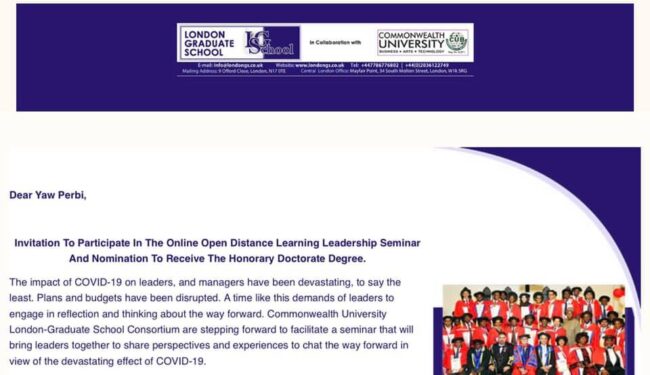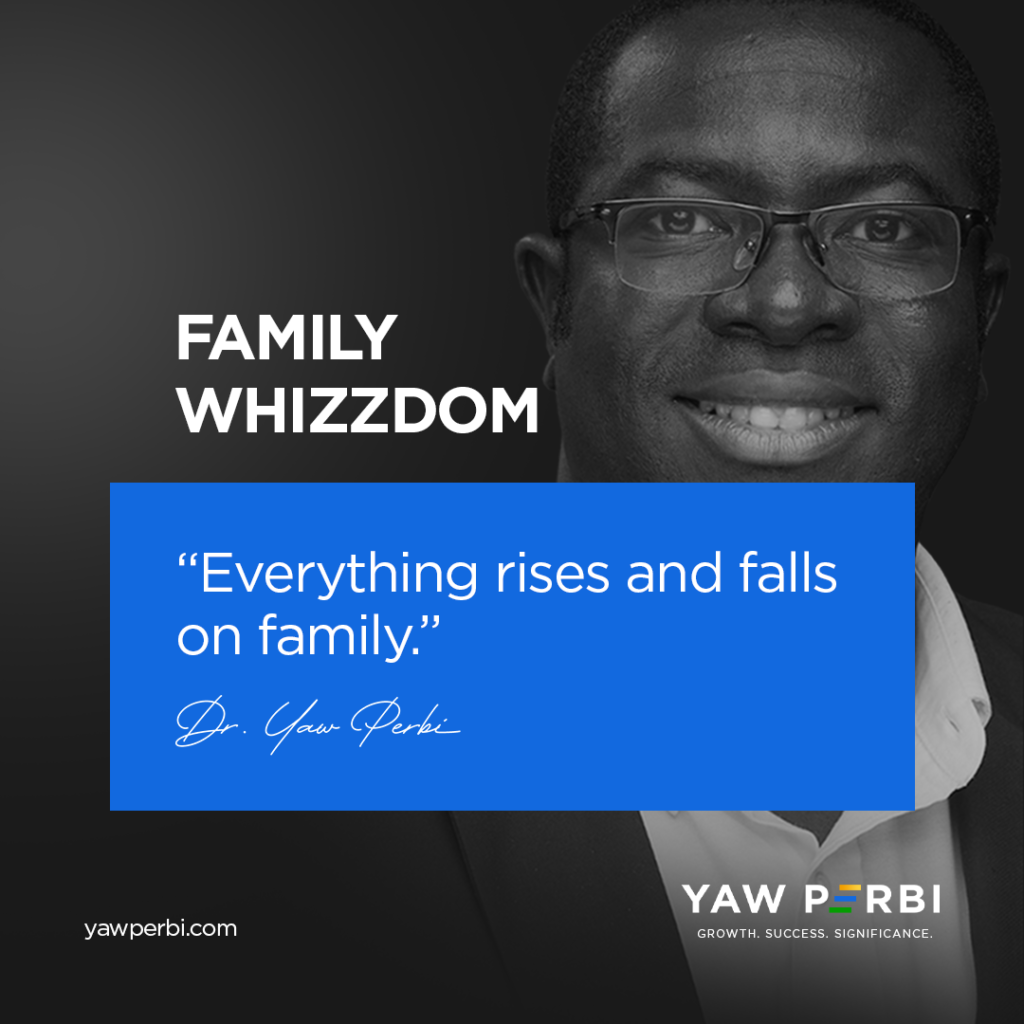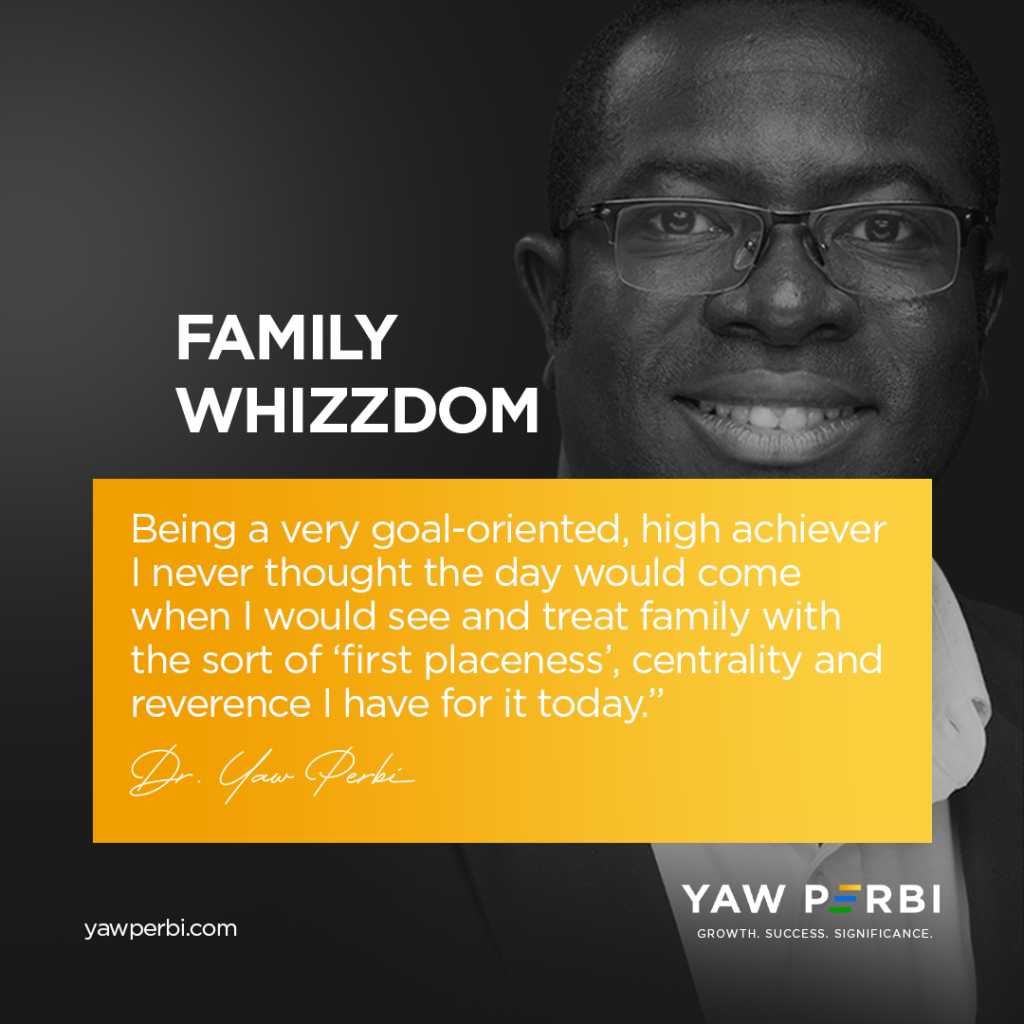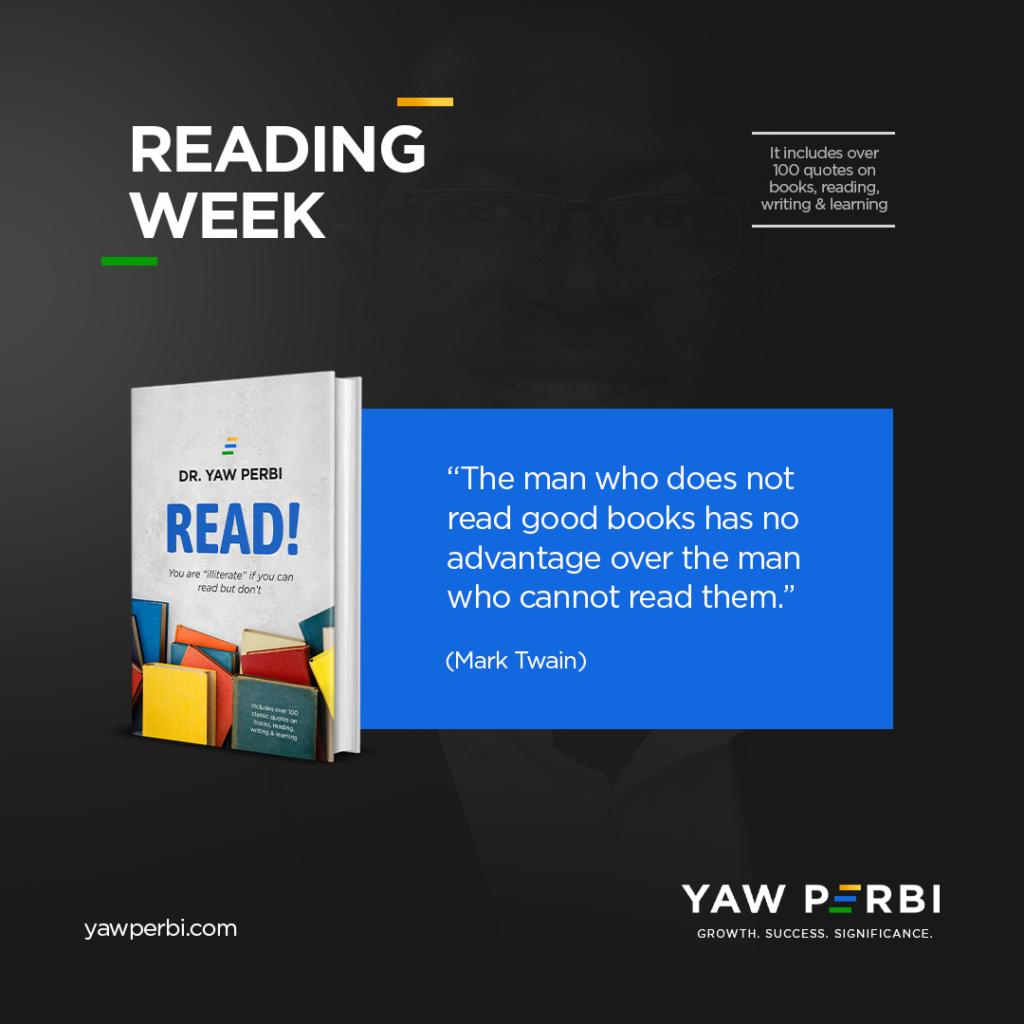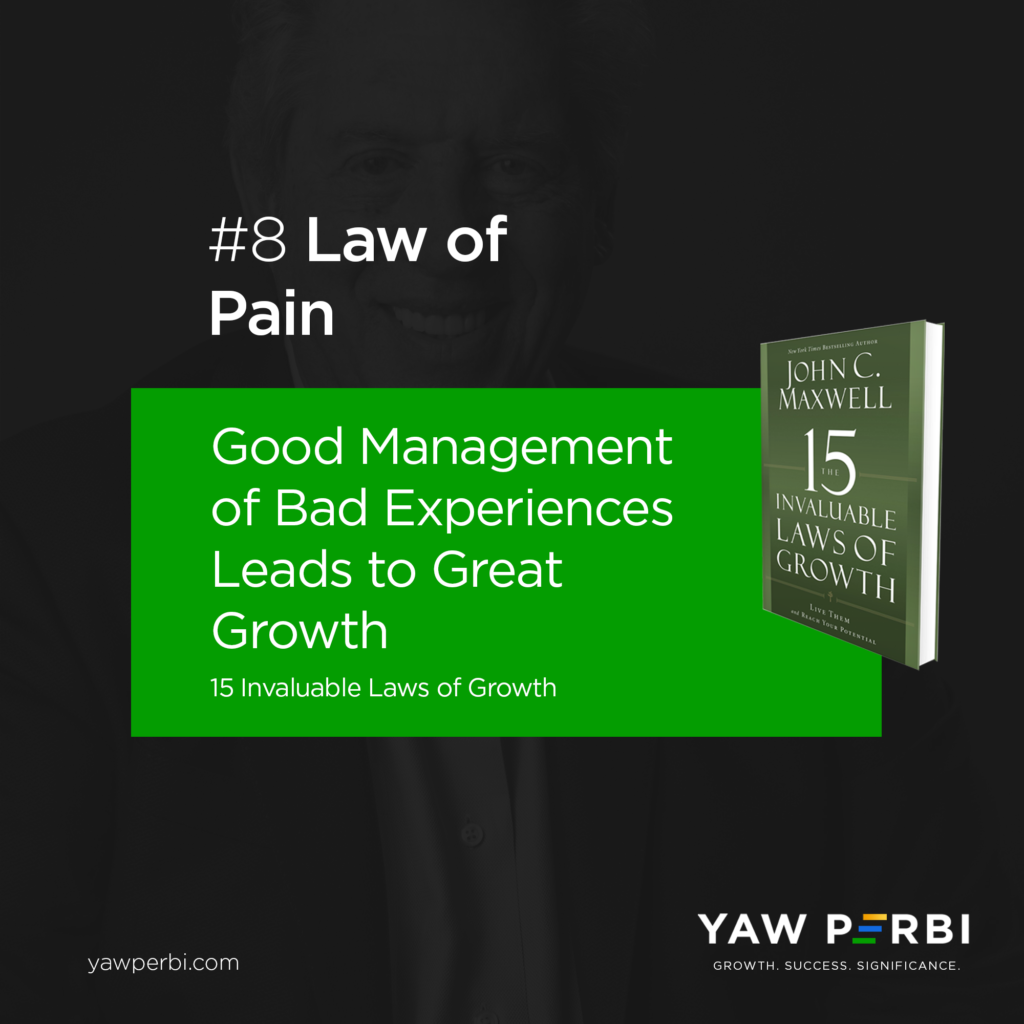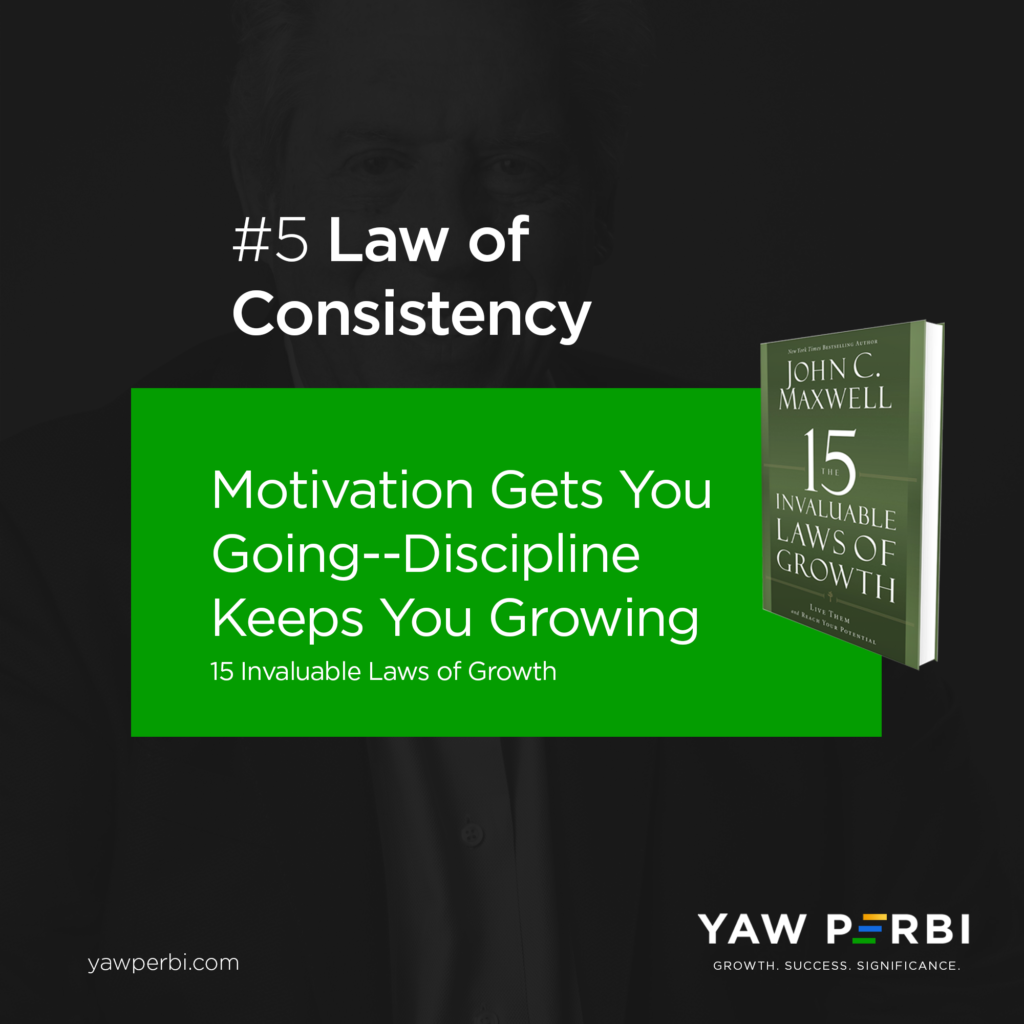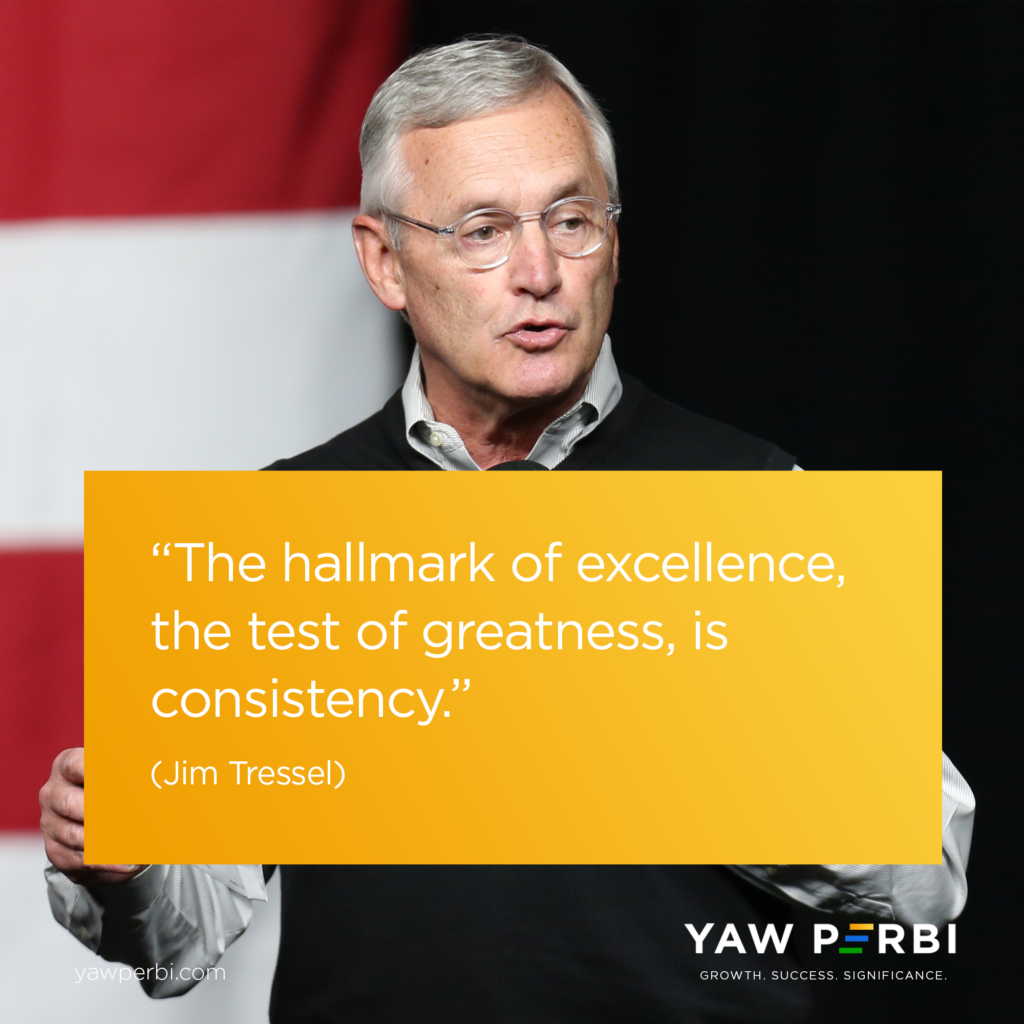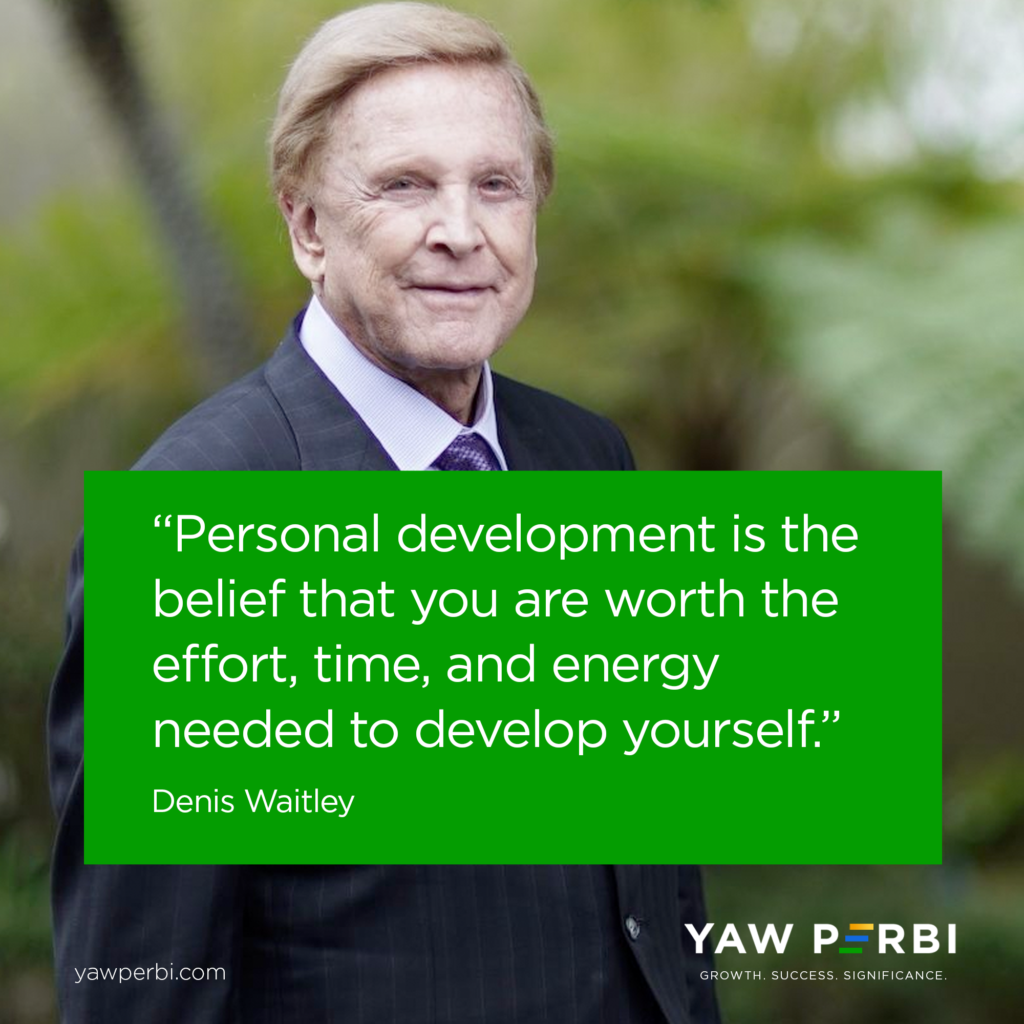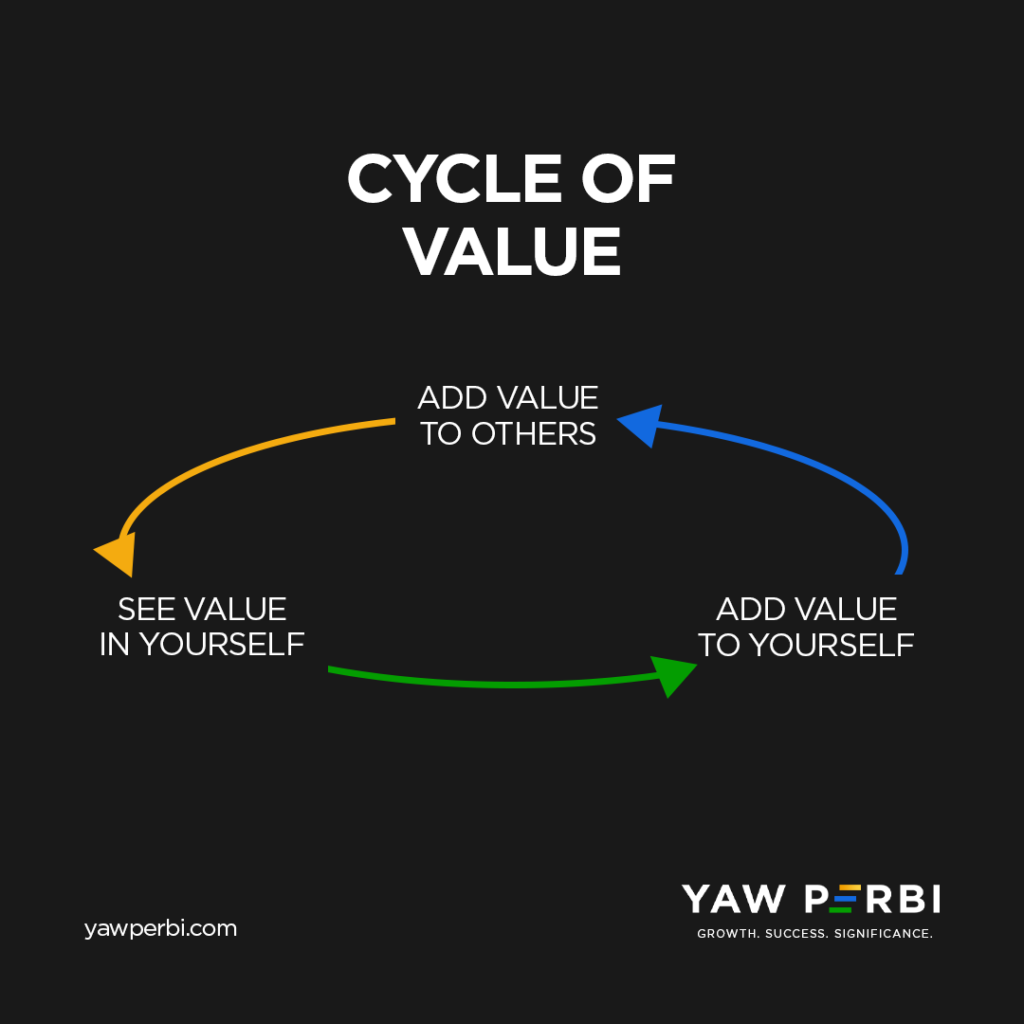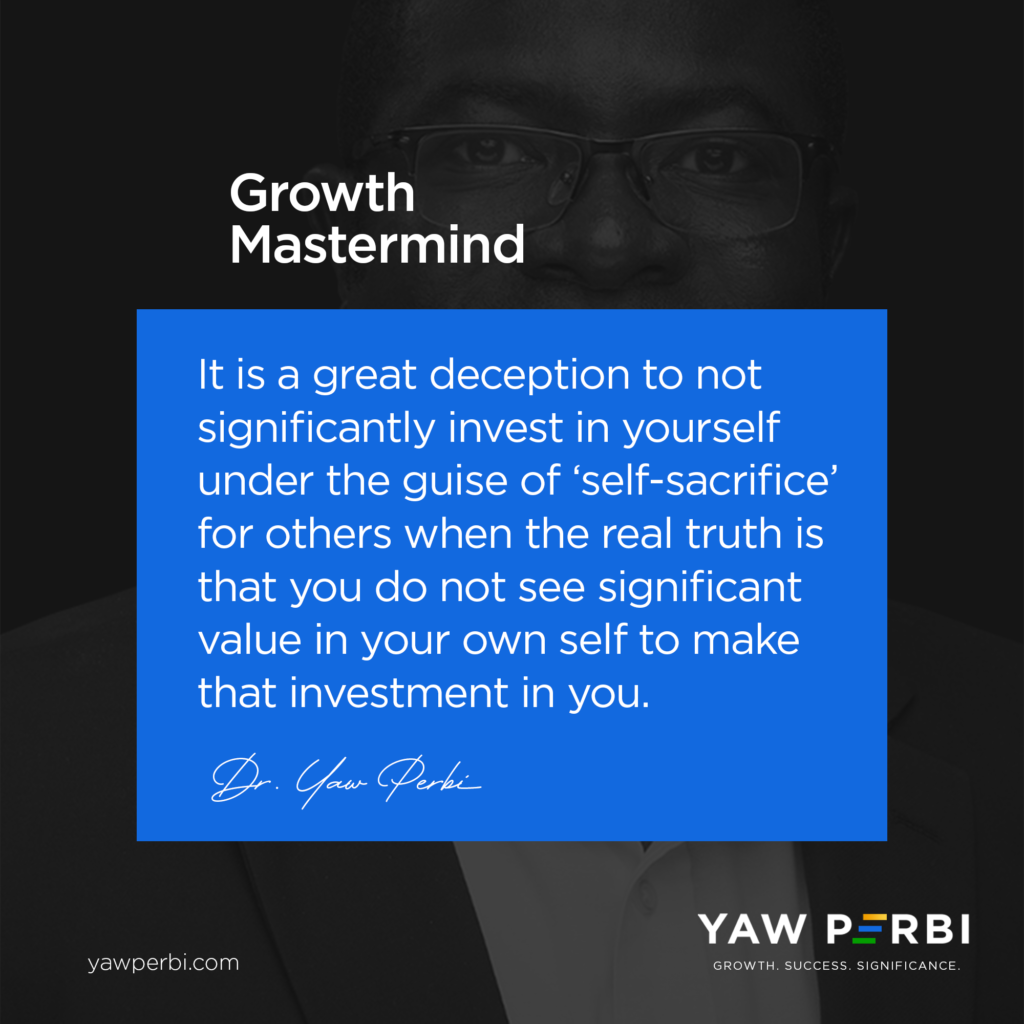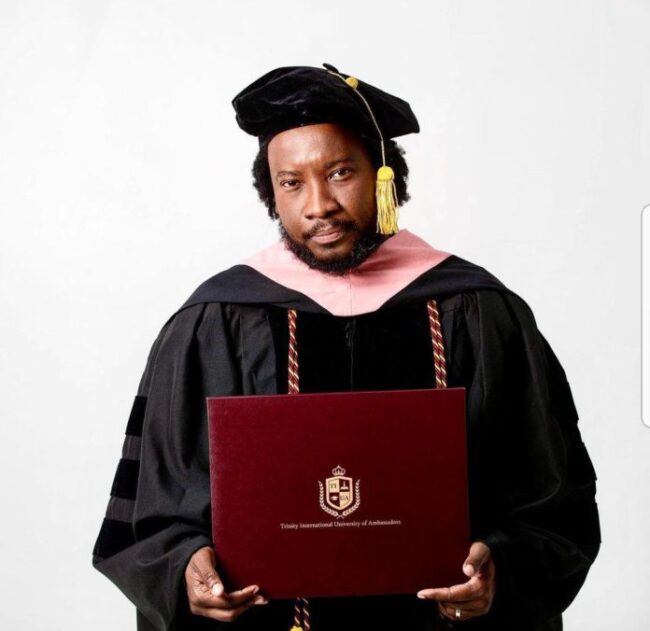
Nothing to Prove, Nothing to Hide, Nothing to Lose
Recently I received an email (partly screenshot above) announcing my nomination to receive an honorary doctorate degree. It is is possible that I would have felt more flattered and been more tempted to go after this fake degree from these fictitious institutions had I not already been a “Dr.” (medical). Coming from a family in which my grandfather was an emeritus professor and where my mother and father-in-law are PhDs in history and economics respectively, these titles don’t exactly faze us. Yet those who offer them know they are toying with very powerful human emotions, motivations and identity issues at the core of our being and have made a good business of it. As my best friend said when I forwarded the said email to him, “this has nothing to do with you; it has everything to do with business.”
Some however, including many Christian leaders, have taken the bait and gotten decorated with very dubious degrees and titles. Recently, there was a huge brouhaha over a popular Ghanaian musician based in London who was alleged to have amassed three degrees, including a PhD, within four months! Perhaps if he had even shut up, none of this would’ve become an issue of investigation and castigation setting social media abuzz but he was flaunting it and ‘praising God’ for the fake feat. The desire to flaunt it itself reveals the very identity and emotional challenges he might have that perhaps led to him to go for those inauthentic accolades in the first place.

Popular gospel singer, Sonnie Badu, has now supposedly earned the title ‘Dr’ after bagging a doctorate in Musicology and being awarded two more degrees.
The above picture of Sonnie, whose giftedness is unquestionable but his academic credentials are, was uploaded by himself on social media touting his feat. I have met Sonnie. He is a fine young man and anointed. But I can also tell you he is far from perfect; just like you and me. Speaking of Sonnie and musicology, incidentally, my grandfather was a celebrated ethnomusicologist. His work earned him many accolades including several honorary doctorates but he never used the title “Dr.” because although he had done enough original research work to deserve ten doctorates he never really formally pursued a PhD per se. Interestingly, he shot straight from ‘mister’ to ‘professor’ and was ’emeritus professor’ for the last three decades or so of his life.
This degree brouhaha touches on at least three issues: identity, purpose and authenticity.
IDENTITY
There was once a programme organized by a friend of mine. The MC got on stage and introduced a certain pastor to come up and offer a prayer. He inadvertently introduced him, with no malice, as Mr. XYZ. XYZ comes up, grabs the mic and makes a correction, “I’m not Mister, I’m Pastor.” That wasn’t all; it gets worse. Later he clears his throat and amends his correction saying something like, “In fact, I’m not Pastor, I am Reverend.” Ahem. Wow! What a shock, what a shame.
But lest I come across as holier than thou, remember I told you that the people offering fake degrees know exactly what they are massaging in us: the ego. I can tell you that as a medical doctor myself there are many times when people address me in speech or in writing as ‘Mr.’ and I have a natural gut reaction to get offended, said in my head something like “do you know who you’re talking to?” and yearned to correct them. There’s a part of me that even justifies it thus: “mehn, but you earned it.” That, my friend, is not the authentic self.
We need not, and indeed should not, root our identity in external things like what we wear, how much we earn, what degrees or title(s) we have acquired. Anything that man can give you, man can take away. Let’s not root our identity in any such thing. And you would think that supposed men and women of God would know better and root their identity in nothing less than Christ himself.
PURPOSE
You may have ‘more degrees than a thermometer’ and still not accomplish your God-given purpose. There are some without degrees at all and yet have made much more impact in the world than those with many letters behind their names. Your purpose in life determines the vehicles and tools you need to use. It’s strange to make the acquisition of vehicles and tools our primary objective when one hasn’t first sat down to evaluate if that is what they need to get done the job they came on earth to accomplish. It’s about dreams, not diplomas and degrees.
Did you read about the recent brouhaha over the apparent insistence of Jill Biden, wife of the current U.S. president, to be called “Dr” ? It’s really been going on for at least a decade now: “Hi, I’m Jill. Jill Biden. But please, call me Dr. Biden.” The December 2020 op-ed by Joseph Epstein in the Wall Street Journal implored Jill Biden to “think about dropping the honorific, which feels fraudulent, even comic.” Personally, I think the essence of what Epstein was trying to say became lost in what became an embroilment in sexism. The real question should be: does being ‘Dr.’ make Jill a better educator (that she’s been for decades) or not? Everything else is secondary; even tertiary.
AUTHENTICITY
This degree saga leaves a lot to be desired when it comes to authentic leadership. It speaks to the core of authenticity. Authentic leaders have:
- nothing to prove–a matter of humility (not try to project self worth)
- nothing to hide–a question of integrity (no playing of games but totally transparent)
- nothing to lose–a matter of simplicity (not strive for social image or popularity).
As you might have noticed, humility, integrity and simplicity as an acronym spell HIS. This is particularly instructive to Christian leaders. Those of us at the Third Lausanne Congress on world Evangelization in Cape Town in 2010 were passionately exhorted by theologian Chris Wright to be God’s saints, Christ’s people, HIS people of humility, integrity and simplicity.
NOT SO WITH YOU
Again, especially for Christian leaders, the primary power base of an authentic (wo)man of God is spiritual power—not positional or personal power. Others may go that route but Jesus was very clear to his followers who would be leaders: “not so with you.” In May 2020, I wrote quite extensively on that here. We need to lead different. This issue just won’t go away until Christians really chose to be H.I.S. people.
CONCLUSION
In light of the recent brouhaha about fake degrees, Friends, BE WARNED. Don’t allow your ego to be stroked and stoked, making your false self acquiesce to receiving fake degrees from fictitious institutions. If you want a degree, go to school and study for one! In any case, one doesn’t necessarily need a degree to succeed in life! Hopefully your going for a diploma or degree would only be because you have observed It will a good vehicle or tool towards your dream. Again, the thing is: You can have ‘more degrees than a thermometer’ and still not fulfill your God-given purpose in life.
I have a mentor who likes to say, “the thing about titles is that if you’re good you don’t need them; if you’re not they won’t help you.” Heaven help us!

Family Foundations No One Lays Yet Everyone Needs
One of the most stupid things I’ve ever done is to travel 10 whole years into marriage before ever seeking formal post-marital counselling. After the several pre-marital sessions lasting many months in 2006, Anyele and I went in the power of that for a decade until we felt we needed further formal, external help. Why on earth did we do that?
Come to think of it, every 5,000 km or so we were changing the oil in our car and getting it serviced yet not so with our marriage. Doesn’t every marriage need regular marriage maintenance? Why wait till we’re sick before we see a doctor when we can at least do annual check-ups? In fact, I would say we came from a culture where seeing a counsellor connoted there was a pathology; and not so much a maintenance thing.
Friends, I’ve had several conversions since August 12, 2006 that have better aligned and further fortified what I thought were already ‘excellent foundations.’ Sometimes there’ve even been foundational cracks I’ve had to fix (and God knows I’m not done). For time to time I’ve come across new information that has caused me to repent, have a change of mind, and realign our foundations to keep this family building strong and lasting.
EXAMPLES OF FAMILY FOUNDATIONS TO REVISIT
Feel free to say “shame on you Yaw” but I had never heard of a family genogram until barely five years ago! How could such an important tool and exercise not have been part of our foundations when we set out a decade-and-a-half ago? And if you’re asking “what the heck is that?”, then trust me, you don’t even know you need one until you eventually discover it. Afterwards you would wonder how in the world your family had been surviving without one. I say ‘surviving’ because you will then notice that what you thought was ‘thriving’ wasn’t quite so.
Then there are basic tools for connecting with spouse and children on a deep emotional level we only received in the last five years. We learnt the 10/10 from the Pellmans and Temperature Reading from the Scazzeros. “Love your wife,” yes I want to. “Respect your husband,” yes she wants to. But how? The Kraemers also gave us tools for this.
And all this is for a good-looking couple who had a pretty solid family heritage, coming from a few generations of good Christian homes, being smart, leaders of our church youth fellowship who had lived virtuously and gotten married as virgins. We even themed our wedding “a celebration of purpose, passion and purity.” Alas! We who ‘had it all’ have realized there are family foundations everyone needs yet almost no one lays. The very marriage mentors who have been blessing us with these paradigms, praxes and practical tools are passionate about their ministry of marriage mentorship today precisely because they themselves didn’t have these when they were our age!
Family is a BIG deal. It is the basic unit of society, just like the cell is for all biological life and the atom is for all matter. Yet the thing about family foundations is this: just like finances, very little about how to make it work well is taught in school about it. If one isn’t fortunate to have a spiritual community that provides quality family life information and formation, you’re in a hard place. There are many divorces that are preventable, if the foundations could be reconfigured. There are some we’ve been able to help save by God’s grace; and others… well… too bad, too late.
THE MOST IMPORTANT PART
Few will argue against the assertion that the most important part of a building, or anything else that is built for that matter, say a marriage, is its foundation. A ton of things have been said about foundations. Gordon B. Hinckley asserts, “You can’t build a great building on a weak foundation. You must have a solid foundation if you’re going to have a strong superstructure.” Adding his voice, David Allan Coe says, “It is not the beauty of a building you should look at; its the construction of the foundation that will stand the test of time.” The greatest teacher of all time, Jesus Christ, classifies life builders into two categories, wise and foolish, purely based on thee foundations they lay: the foolish build on sand, the wise build on rock.
My beloved mentor Peter Scazzero talks about foundations a lot in the Emotionally Healthy Leadership paradigms he teaches. And no wonder, since like the typical New Yorker he is, Pete is ever so familiar with the skycraping towers of Manhattan. This is how he explains the importance of digging deep foundations if we are to build life’s tall towers of significance:
Manhattan consists almost entirely of bare granite, a very hard and strong type of rock. To carry the weight of a 75 or 100 story skyscraper, foundations known as “piles” are used. These are concrete or steel columns hammered into the ground with a massive crane until they penetrate solid rock.
Some pilings go twenty-five stories under the ground. The heavy weight of the skyscraper is then distributed through each of the deep “piles” in the ground below. Together they are capable of supporting the structure’s enormous weight.
If the pilings are drilled in poorly, cracks eventually appear in the structure. Entire buildings may lean. Then they must be torn down or lifted completely so the piles can be reset – a costly and time-consuming process.
FAMILY FOUNDATIONS MASTERMIND
As you might be aware from a previous blog, “a mastermind group (often shortened to just ‘masterminds’) is a peer-to-peer mentoring group used to help members learn together, solve problems, birth new ideas and gain clarity with input and advice from the other group members.” For eight weekly sessions, from April 4 to May 30, I shall be walking along with a dozen leaders who want to re-examine their family foundations and receive new paradigms, praxes and practical tools to finally fix faulty family foundations. Inputs will include several book chapters, videos, articles, practical exercises, discussions and debates. Two special features and benefits will be FREE membership of an online chest of over 20,000 resources and a FREE DISC Personality assessment with a 37-age customized report!
You can be sure that “mastermind groups are great in holding each other accountable for the goals and outcomes each member comes up with themselves” (see here). Outcomes and outputs of this particular Family Foundations Mastermind are as follows:
- Paradigm Shift on the Prime Place of Family
- Ancient Wisdom Applied
- Current Family Systems Theories Tested
- Practical Relationship Tools (for emotional connection, communication, forgiveness)
- Family Genogram
- Behavioural Assessment
- Emotional Needs List & Action Points
- Family Mission Statement
- Hierarchy of Priorities Configuration
- Integrated Life Exploration & Commitment
Register here and let’s go back to basics. Let’s finally fix faulty family foundations that everyone needs to but hardly anyone does.

Work harder on yourself than you do on your job.
Over the last week, somehow this notion of needing to work harder on yourself than you do on your job has come up with two or three different coaching clients. For the CEO of a crucial agro business firm in West Africa, the financial services entrepreneur in Canada and the PhD-wielding academic on the east coast of the United States, the three reasons I’m about to share held true. It is true for you too.
For the record, I work hard and believe in hard work. I also work smart and absolutely promote the idea of brain over brawn anyway. Over a decade ago I came up with the phrase, “brain power pays; muscle power pains.” I subscribe to the Pauline exhortation that “whatever you do, work at it with all your heart, as working for the Lord and not for man.” So by all means, work hard and smart on your job, but work even harder and smarter on yourself.
Here are three reasons why:
1. WHO YOU ARE IS MORE IMPORTANT THAN WHAT YOU DO
No matter how hard or smart you work, the instrument for the doing the do is you. If the input into you doesn’t match or exceed the output, that will soon be your undoing. Let me put it in a way one of my staff in British Columbia said it to me a few years ago: “If your output exceeds your input, then your upkeep will be your downfall.” Classic! Not only will you soon not be effective and efficient when your self input is less than your job output, it is unsustainable and you might end up becoming irrelevant. And sometimes, irrelevant not just in terms of knowledge and skills for a context that has progressed because you’re not healthy or even physically alive anymore–you killed the goose that lays the golden eggs!
Consider these sagacious words of educator Palmer Parker:
“When I give something I do not possess, I give a false and dangerous gift, a gift that looks like love but is, in reality, loveless—a gift given more from my need to prove myself than from the other’s need to be cared for…. One sign that I am violating my own nature in the name of nobility is a condition called burnout. Though usually regarded as the result of trying to give too much, burnout in my experience results from trying to give what I do not possess—the ultimate in giving too little! Burnout is a state of emptiness, to be sure, but it does not result from giving all I have; it merely reveals the nothingness from which I was trying to give in the first place.”
Remember, who we are is more important that what you do, because we do whatever we do out of who we are: our identity, character, values.
2. ONE MEANS A LIVING, THE OTHER MEANS A FORTUNE
Classic motivational speaker of blessed memory, Jim Rohn, poignantly put this in a way like nobody else has: “Learn to work harder on yourself than you do on your job. If you work hard on your job you can make a living, but if you work hard on yourself you’ll make a fortune.” This statement, I believe, is a variation of timely advice Jim himself received from his mentor J. Earl Schoaf. Jim had heard him give the reason for why the job only pays the bills but the latter ends in billions: work harder on yourself than you do on your job; your income is directly related to your philosophy, not the economy; and for things to change, you must change.
From a one-year college drop out living from pay check to pay check as a stock clerk at Sears, this advice catalyzed a five-year mentorship of Rohn by Shoaff, encouraging him to develop himself and pursue his dream of a better life such that by age thirty one, Rohn was a millionaire! It was a really sad day when this motivator of motivators like Anthony Robbins, Less Brown, Brian Tracy and Denis Waitley, passed away in December 2009.
Friend, work harder on yourself–from your paradigms through your attitudes to your skills. It’s the software that you carry and apply to a variety of endeavours, not only your job, that will unlock abundant wealth and well-being.
3. JOBS COME AND GO BUT YOU’LL STILL BE HERE
Sometimes people leave jobs; other times jobs leave people. In the kind of post-pandemic economies we have now, more jobs leave people than people leave jobs. Certain whole industries have been wiped out, for crying out loud! I’ve marvelled at how many pilots have been literally grounded and have had to find some other kind of livelihood. What if all you did was work hard on your job and never grew your other interests, talents and skills or even never networked beyond the ‘boys club’ in your profession?
When many years ago I decided to take the path of the risk of entrepreneurship rather than the ‘security’ of a regular paid job, some people who thought I was crazy later found out they had been crazy to think ‘owning a job’ was better than owning a business when in spite of their qualifications, loyalties and skills their jobs were cut. Former Microsoft COO, Kevin Turner, said it best: “The only job security we have is our individual commitment to personal development.” Your job today may not be there tomorrow–in fact your entire industry might not be there–but you will. Work harder on yourself than you do on your job forwhen tomorrow comes, your preparation will meet opportunity. That’s what they call success.
QUICK PRESCRIPTION
Do the following to ensure you are working hard on yourself for your personal growth and development: set aside a time for YOU, a ME time, everyday. Mine is 5-6am everyday during which I read my personal mission statement, review my goals, read for at least 15 minutes and express my thoughts and feelings in writing.
For all the coachees I mentioned at the beginning of this blog, each was working super hard at their jobs. It is my job to ensure that while they do that, they strive towards working even harder on themselves than they do on their jobs. There’s no great future for anyone without that.

Everything Rises and Falls on Family.
My mentor likes to say, “Everything rises and falls on leadership.” This is true but there is something even more fundamental that all leadership itself rises and falls on. I say, everything rises and falls on family first. At least five reasons come to mind why:
1. CREATOR PERSPECTIVE | God is Family
“In the beginning, God…” That’s how the entire holy scriptures begin in Genesis 1:1. I have a theistic worldview as a bonafide African, and a Biblical one at that as an African Christian. My understanding is that everything is created by a Supreme God and that He created human beings in His image and likeness. That tickles my theological senses a lot because according to the Christian view, GOD IS FAMILY. At the centre of the universe is family–Father-Son-Spirit. At the core of cosmos is a love, relationship–Love, Lover and Love itself. Everything rises and falls on love, everything rises and falls on God, everything rises and falls on family.
Of course we could go into how God created the first family after declaring “it is not good for man to be alone,” how throughout scripture and history God chooses a person and their family to work through, the many scriptures that seek to protect, preserve and promote family etc. Even when God decided to wrap Himself in human flesh and move into our human neighbourhood in the person of Jesus Christ, he chose to implant himself in a family–Mary and Joseph’s. Everything rises and falls on family.
2. CRADLE PERSPECTIVE | Parents shape world shakers
Have you ever heard the proverb, “The hand that rocks the cradle rules the world”? That is 1865 wisdom unleashed on the world through the refrain of a William Ross Wallace poem that praises parenthood as the preeminent force for change in the world (see here). Of course, at the time it was written, nearly two centuries ago, the work of raising children was mainly seen as the role of the mother but we know all too well it takes two to tango. Both father and mother have a role in rocking the cradle, even procuring that cradle in the first place. Parents and the wider family, shape the people who would shake and move the world, for good or ill. These two PhDs Barbara Riggs and Cynthia Tweedell don’t mince words in their Marriage and Family textbook: “The strongest influence in your life will stem from family.” Period. Everything rises and falls on family.
3. CELLULAR PERSPECTIVE | Family is the unit of humanity
So yes, “it is the hand the rocks the cradle that is the hand that rules the world” but alas! today, everyone wants to change the world; no one wants to start at home. The irony! Not only does everything rise and fall on family because the hand that rocks the cradle rules the world but also the family is the basic unit of society just as the cell is the basic unit of biological life or the atom is for all matter. Yet somehow we think we can flourish in the corporate world, government and such without adequately addressing the lowest common denominator!
If you think one cell gone bonkers is no big deal think again about cancer. That’s all it is. Cells gone bonkers, multiplying unhealthily–and eventually spreading that craziness (metastasis). Sooner or later a whole monarch or president or parent dies, all because of a cell gone awry. Everything rises and falls on family, that one cell.
4. CALCULATION PERSPECTIVE | Hindsight is 20/20
Today’s C-level executive claims “It’s not the quantity of time but quality that I spend with my family that matters.” This is a fallacy. Family costs what it costs and it doesn’t go on sale! The question is if we are willing to pay the price.
Even for the richest and most popular of leaders, when they assess their lives, doing a calculation of all they’ve spent their talents and energies, time and finances on, the truth remains that, “There’s no one who on their deathbed has been heard to say, “I wish I had spent more time at work.”” What folks should’ve known first, they only find out last: Everything rises and falls on family.
5. COVID-19 PERSPECTIVE | The only place to be/go has been home.
When our all-important selves on our all-important endeavours were brought to a screeching halt by the latest Coronavirus pandemic, where did we all head? Home! When literally every economy and society locked down, where did we stay put and be safe: with family! I’ve never seen so many advertisements on primetime television asking people to stay home in my life! Heroes, according to the World Health Organization, stay home! Ha! Who would’ve thought that day would ever come!
Even high-flying pilots have been grounded, literally, at home. I haven’t flown in a year–that is crazy considering that there were times in the last few years when I did as many as 70 flights in the year! My VIP airport lounge passes and platinum airline and hotel statuses have been rendered useless. The only thing that has mattered most has been the people many of us paid the least attention to prior to COVID-19: family. Of course, some families have turned at each other and self-destructed because of the very forced proximity that should’ve been a blessing!
Crucibles reveal what’s most important. After this pandemic is over, we would need insignia to remind us, lest we forget, everything rises and falls on family.
THE MILLION DOLLAR QUESTION
So why then do many, too many, in our generation tend to put family on the backburner? What if we all invested in our families the same degree of seriousness we put into our professions or in climbing the corporate ladder? I’ve been amazed at how many C-level executives are executing vision and mission statements and strategic foci for their organizations but have not given a thought to forging a simple family mission statement yet alone execute it.
Granted, some people really want to give their families their best shot but they just don’t know how or don’t have the tools to. Since Anyele and I welcomed our seventh child into the world, we’ve had so many puzzles and questions thrown our way that we’ve decided to hold a free online session from time to time for various folks to share our hearts, heads (ideas) and hands-on stuff (skills) about family, theirs and ours! Would you believe after our first 2021 15 Laws of Growth Mastermind through January and February the one thing that made all these participating professionals vote for an extra/bonus Mastermind session, which I obliged to facilitate for free, was family?
In one of the quarters of each year, my coaching company will run a 60-day journey through powerful principles of family foundations in a paid mastermind group for healthy family growth, based on ancient wisdom, current family systems theory and practical tools that work! This will be targeted at C-level executives comprising weekly 90-minute online sessions for eight weeks with lots of readings, video clips, assignments, inspiration, encouragement and accountability throughout the weeks! Each week, a unique practical skill will be learnt to better our relationships.
Family: everyone has one–no matter how dysfunctional or atypical. Even if we don’t form one of our own (family of procreation), everyone comes from one (family of orientation) that we didn’t choose. I confess that being a very goal-oriented, high achiever myself, I never thought the day would come when I would see and treat family with the sort of ‘first placeness’, centrality and reverence I have for it today. Perhaps if others also had a paradigm shift that everything rises and falls on family, everything would change too.
What do you think?

Family Planning Isn’t What You Think
There has been such an overwhelming response (over 80,000 reached!) to a social media post I made regarding a misconception about the essence of family planning that I felt it might be useful to document that write-up on this blog.

Our six older children totally excited about the arrival of the seventh the day we got back from the hospital after delivery.
On Tuesday, March 2nd our seventh child was born. The rather long boy descended down his mother’s birth canal at the Montreal Jewish Hospital in all his 3.895kg glory. The posting of this momentous occasion on social media sparked a flurry of responses, almost 100% affirmative but I won’t be fooled. Not everyone thinks my wife and I are smart, planet-friendly, trendy, progressive, modern and such.
Just a couple of weeks earlier I had been on a Zoom call with a just-married pastor in Ontario who hopes to have a family of three children. Upon hearing that Anyele and I were expecting again, our seventh child for that matter, he unwittingly asked, “why so many?” To which I responded, “why so few?” The blushing of his face and awkward laughter revealed his embarrassment.
I have mentioned before how people have made it very clear to Anyele and I that they would rather raise pets than have children. Generally our human selfishness/self-centredness doesn’t allow us to do the parenting thing (at all or well) because children are an inconvenience, suckers, an unwelcome reflection of our marred selves, among a host of other postmodern reasons. See here.
“WHY SO MANY?”
We have met people who are proud DINKS–Double Income No Kids. In many circles we’ve been in, this has been the ‘in thing’ or at best two is the most ‘decent’, ‘smart’ and even ‘cute’ thing to do. As I heard one preacher humorously quip, “a boy for me and a girl for you, and praise the Lord we’re finally through!” A year ago, I shared here some of the reasons why Anyele and I have chosen to have “so many.”
Having children or not, many or few at the end of the day is more of a worldview issue than a socio-economic or even climatic one. I share our Christian theist view in this blog. In summary, “There is a higher Being than our selfish selves that beckons; a higher purpose than the painful inconvenience that compels; and a deeper fulfilment of something (and someone) that outlives making merry today and just dying tomorrow.”
THE INTEGRATED LIFE
At our executive education firm, YAW PERBI, we strive for LIFE in all its fullness—#Leadership, #Integrity, #Family, #Entrepreneurship. I personally find it curious that many in the corporate space ignore, even hide, family (and faith) until occasions like Christmas. All of a sudden families come out of the shadows, whipped out and splurged on Christmas cards. You can go on LinkedIn right now and see how it is so ‘professional,’ meaning, almost family-sterile.
I’m super proud of my Wonder Woman Wife, Economist-Entrepreneur Extraordinaire, for the safe delivery of our seventh. We thank God for the privilege of a full quiver of seven lethal arrows for life’s battles, conquests and such. This baby, like the preceding six, will change our lives no doubt—rescheduled meetings, halted plans, budget increases… but what else could life be about?! True success, as my mentor succinctly puts it, is “when those who know you the best, love and respect you the most.”
At Yaw Perbi, we promote people and cheer on companies that seek leadership authenticity by making the integrated life the way to go. Call it life/work balance or whatever you may, our corporate folks, especially C-level folks, must find a way to bring their whole selves to family and same to work. My favourite MBA teacher on this, Bill George, says more about this more eloquently than I could here. Cheers to the #integratedlife, where marriage is not an inconvenience, children are not a nuisance and family is not an afterthought, only receiving the crumps of our time, talent, treasure and efforts.
FAMILY PLANNING ISN’T NO/FEW CHILDREN
Why do so many people wrongly think ‘Family Planning’ means having few/no children? Family Planning is “the ability of individuals and couples to anticipate and attain their desired number of children and the spacing and timing of their births.” Although it was clearly a quote (inverted commas and all), a lot of people on social media were giving me a pat on the back for this spot-on definition without realizing it isn’t something I cooked up to justify my number of children, but actually a World Health Organization (WHO) definition. Of course they add contraception as the means to achieving this desired end of number, spacing and timing.
Even before we got married 15 years ago, Anyele and I purposed and planned to have seven children. There were no guarantees; God ‘engraced’ us. Don’t judge us for having “too many” (in your opinion); we shan’t judge you for having “too few” (in our opinion) or even none.
Your purpose and plan may be different from ours. The most important thing is to ensure that it is God’s unique plan for your unrepeatable family that you are following and not just “comform[ing] to the patterns of this world.”
We hope your Family Planning excites you a lot and scares you a little—just like ours!
Related Blogs
We Really Don’t Like Children That Much Part 1/3
We Really Don’t Like Children That Much Part 2/3
We Really Don’t Like Children That Much Part 3/3
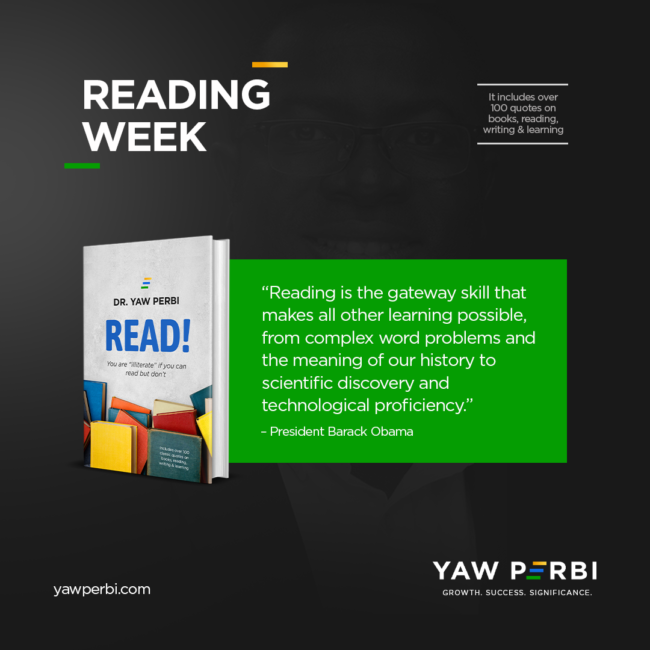
I Used Not To Like Reading. Two Statements Changed Everything.
I wouldn’t be where I am today but for books. I mean precious books like the Holy Bible (which I’ve read cover-to-cover about 10 times), Rich Dad Poor Dad (Robert Kiyosaki), The 7 Habits of Highly Effective People (Stephen Covey), The Purpose-Driven Life (Rick Warren), Before You Say I Do (Yaw Boamah), The 21 Irrefutable Laws of Leadership (John Maxwell), The E-Myth (Michael Gerber), The Prayer of Jabez (Bruce Wilkinson), Create Your Own Future (Brian Tracy), The Emotionally Healthy Leader (Peter Scazzero) etc. My life five years ago is totally different from my life now—and so was my life five years prior to that totally different—just because of the books I’ve read.
Consequently, for a decade-and-a-half now I’ve been a serious reading campaigner. Now, not only have I grown further fierce in campaigning for people to love reading, my wife and I have stepped up by stepping down. What I mean by that is, we’ve enhanced our campaign but decided to go further down to the age where humans are most pliable: childhood. And we began with our own seven children. This is the philosophy behind Perbi Cubs Library Services. You may find the story behind Perbi Cubs here.
But being a reading enthusiast, let alone champion, hasn’t always been so. I used not to like reading, at all! Then two statements hit me hard and totally shifted my paradigm, absolutely altering my way of thinking.
THE ‘RACIST’ & ‘TREMENDOUS’ STATEMENTS THAT CHANGED EVERYTHING
The first statement, I randomly encountered on the internet. I was but a youth then. As I confess in my book READ!, “I was so angry my intestines could have gushed out. If I were light skinned my face would’ve turned tomato-red instantaneously. Yet deep, very deep down my heart I knew there was a truth in this almost racist statement glaring at me from the computer screen.” This is what it said: “THE BEST WAY TO HIDE SOMETHING FROM BLACK PEOPLE IS TO PUT IT IN A BOOK!” Ah! Upsetting! Yet in many ways this is true, I’m ashamed to admit: We don’t read!
The other paradigm-knocking statement was Charlie ‘Tremendous’ Jones’ rather prophetic pronouncement: “You will be in five years where you are today except for the people you meet and the books you read.”
These two statements turned my life around to not only become a voracious reader and prolific writer, but an advocate of the same!
WHAT IS READING?
We all have read (or even still reading even right now) academic or technical texts to pass an exam or for promotion, for professional growth etc. That is not what I mean by my read campaign. When I speak of reading I mean leisure reading. Also known as “recreational reading, pleasure reading, free voluntary reading, and independent reading,” it is “independent, self-selected reading of a continuous text for a wide range of personal and social purposes. It can take place in and out of school, at any time” (International Reading Association).
Samuel Johnson shares the following sentiments: “A man ought to read just as inclination leads him; for what he reads as a task will do him little good.” I get him. Leisure reading must be voluntary and pleasurable–not just a chore–if it is to benefit us maximally.
WHY MANY ARE SCHOOLED BUT STILL “ILLITERATE”
Several of us who have learnt “ABCD…” and can practically function simply do not read. In my book READ!, first published in 2005, here’s my thesis: If you know how to read and you don’t, you are no different from the illiterate! The bottom line is the same: you both don’t read! That’s why the subtitle of the book is “You are an “illiterate” if you can read but don’t.” Many years ago Mark Twain put the same idea this way: “The man who does not read good books has no advantage over the man who cannot read them.”
CONCLUSION
If it’s any comfort to you, a guy who used not to like reading today reads several books at the same time! Even further, I’ve acquired this new habit of writing several books at the same time too! Something you need for your future to happen is hidden in a book near you. As they say at Perbi Cubs, “success is just a book away.” And it’s true. If you don’t believe Perbi Cubs or Charlie ‘T’ Jones, take it from me.
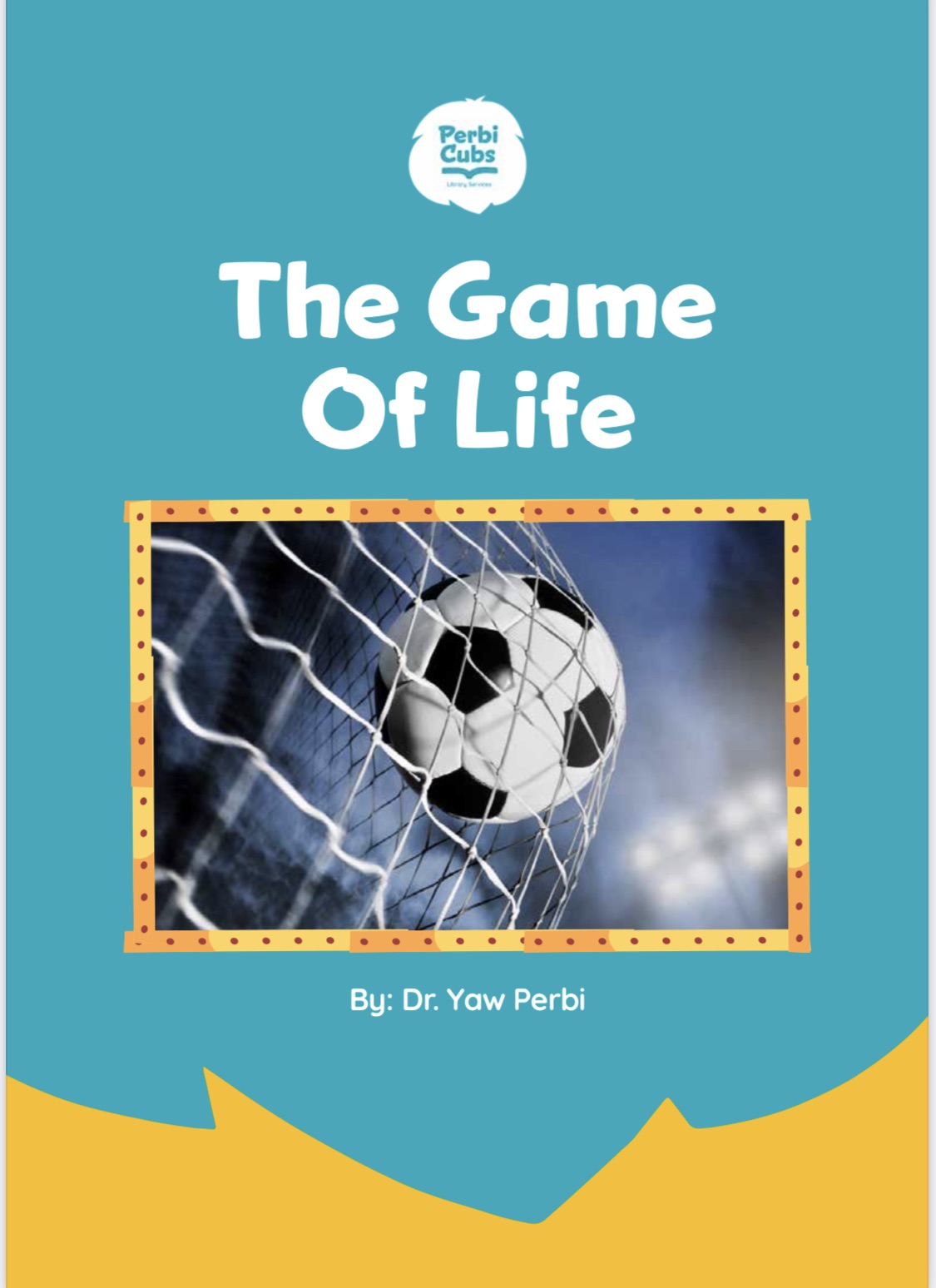
Life is Like Football | There’s No Winning Without Goals
The content of this blog was first published for patrons of Perbi Cubs Library Services. I feel compelled to largely reproduce it here (with tweaks) because of the alarming rate at which adults (including parents of these cubs) are feeling jaded by goal-setting. Perhaps like the greatest teacher who ever lived put it, our attitude should be like children in order to best learn.

Front cover of original book for Perbi Cubs
“GOOOOOAL!!!” It is not uncommon to hear the whole city or town where you live roar “GOOOOOAL!!!” This is when the favourite local or national football team scores a goal. Sometimes the whole city is dead silent, like a cemetary, because people are anxiously watching the game at the stadium or on television. Some even combine listening to radio commentary with watching television pictures at home! There are barely cars on the road or people in the street. You would think it is a ghost town if you were a visitor passing through until all over a sudden you are jolted by the loud roar “GOOOOOAL!!!”
There will be no point of the game of football without goals. And that is why there are goal posts with a net to capture the ball. The way to get ahead in the game is not all the activities of passing the ball, dribbling, somersaulting or even striking the ball hard and strong but getting the ball into the opponent’s goal posts. The goal of football is to win by scoring goals. Otherwise, all the activity does not mean any accomplishment!
And it doesn’t matter if you are not a football fan. The principle is the same, whatever your favourite game or sport is. Is it basketball, tennis, or swimming? What is the point of the game or sport? How do you keep score? Is there any way to determine who won without keeping score?
LIFE IS LIKE FOOTBALL
It is hard to imagine a game without goals yet many people play the game of life without any goals. No matter how important games or sports are, they are not as important as life itself. So if even football has goals to win how much more should we set goals in life to win at the game of life! And using the notion that Covid-19 derailed much of our goal-setting in 2020 so setting goals is of no use anymore is as ridiculous as saying because a certain football match was rained off (or postponed because there was an earthquake) there should be no more football in future. You must’ve heard before that extreme cases make bad laws.
You may also have heard it before that “if you fail to plan, you plan to fail.” There is nobody I know who plans to fail in life but if they fail to plan, they are automatically planning to fail. You may be very busy in life or working very hard but remember, activity does not mean accomplishment. And without goals, you cannot measure accomplishment.
WHAT A GOAL IS AND HOW WE FAIL
A goal is an aim; an end. A goal is the result to which your activities or effort is directed because activity is not necessarily synonymous with productivity. In a game like football, the goal is physical and obvious. In life, one has to be more intentional about what goals are. Mentor Maxwell calls a certain principle the Law of the Rubber Band: “growth stops when you lose the tension between where you are and where you could be.” So we all need stretch goals! For goals to grow you,“a goal should scare you a little, and excite you a lot,” says Joe Vitale. It is quite the art trying to gauge the best tension because either extreme–too easy or too hard a goal–and we loose the tension in our life’s rubber band (so-to-speak). We’re either too lose and useless or too taught and snap–useless too. We hit nothing when we don’t get the tension right. The goal should stretch but not break us. More about this in my next blog.
The other thing I’ve learnt recently is the best chance of meeting a goal is to set it in line with your personality type (take the DISC personality assessment now if you haven’t). While the high I (sanguine) might be motivated by making a game of goal-setting and rewarding themselves to hit their goals if the high D (choleric) finds a goal whose accomplishments puts her “in charge” (they love control) she will breeze through hers!
IN WHICH AREAS SHOULD WE SET GOALS?
We should set goals in every area of our lives. If we do then we can have all-round success. The greatest leader who ever lived, Jesus Christ, lived a holistically successful life in part because as a little boy, “Jesus grew in wisdom and stature, and in favor with God and man” (Luke 2:52). So we too must set goals in:
-“wisdom” (mental goals)
-“stature” (physical goals)
-“favour” with God (spiritual goals)
-“favour” with man (social goals).
Mental (academic) goals: These are learning goals. A good example of a mental goal may be to pursue a Master’s in business this year .
Physical goals: These are health and wealth goals. A good example of a physical goal may be to eat a fruit everyday this year or to exercise 30 minutes a day at least thrice every week.
Spiritual goals: These have to do with your relationship with God. A good example of a spiritual goal may be to read your Bible and pray everyday.
Social goals: These are about relating to people. A good example could be to institute date nights with your spouse or check on your ageing parents each week.
GOALS MUST BE S.M.A.R.T.
Can you imagine if the goal posts in a game of football weren’t clear? Can you imagine if they could be anywhere on the park at anytime? Also can you imagine if you had no idea how much time you had in the game to score goals and win? Just when you think you have 30 minutes the whistle goes to your surprise within two minutes?
In the same way, the more detailed and sure the goals you set in life are, the better. For us to be able to hit our goals in life, these goals must be S.M.A.R.T. This means they goals should be:
–SPECIFIC: Don’t just set a physical goal like “I want to be healthy.” Be specific by saying, “I will eat fruits to be healthy.”
–MEASURABLE: How many fruits? A bunch of bananas or a dozen oranges? So to make the goal measurable say, “I will eat a bunch of bananas or two dozen oranges to be healthy.”
–ATTAINABLE: The goal should be something you can accomplish. It must be reasonable and realistic. Eating a whole bunch of bananas or two dozen oranges everyday isn’t reasonable. To make your goal attainable, say, for example, “I will eat one banana or one orange to be healthy.”
–RELEVANT: No one should set goals that do not add value to their lives. So ask yourself if this goal adds real value to your life. Is it relevant to be healthy by eating a banana or orange? Yes indeed! This one is a no brainer.
–TIME-BOUND: You must determine if this goal is daily, weekly, monthly, yearly, in five year’s time etc. So to complete making your physical goal Time-bound, you could say, “This year, I will eat one banana or one orange everyday to be healthy.”
LET’S GO LET’S GO!
So! Life is like football. In order to win, you’ve got to have clear goal posts and score goals! Set your goal posts now by setting S.M.A.R.T. goals for the year, quarter, month, week and even today. Score your goals and win in life. That’s the path to success. And yes, you are free to also roar “GOOOOOAL!!!” when you hit your goals too. “GOOOOOAL!!!” Life is like football. You’ve got to have goals to win it.
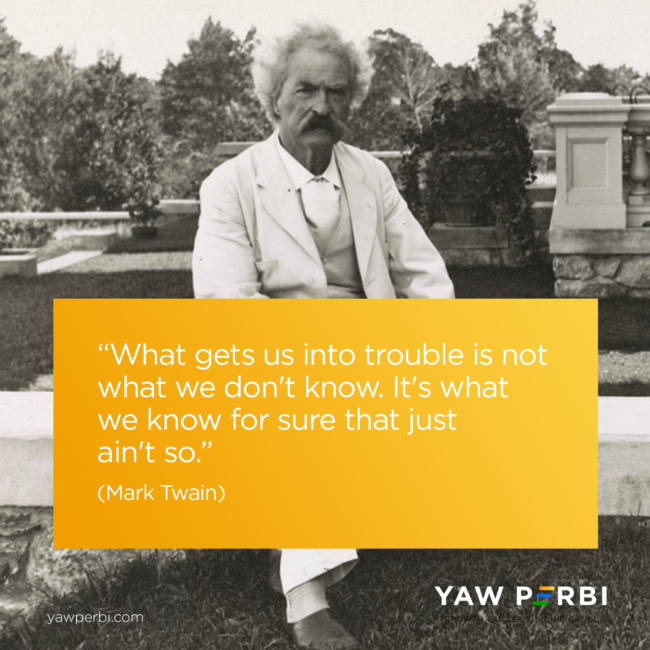
A Way to Prevent Heartbreak: Clarify Expectations
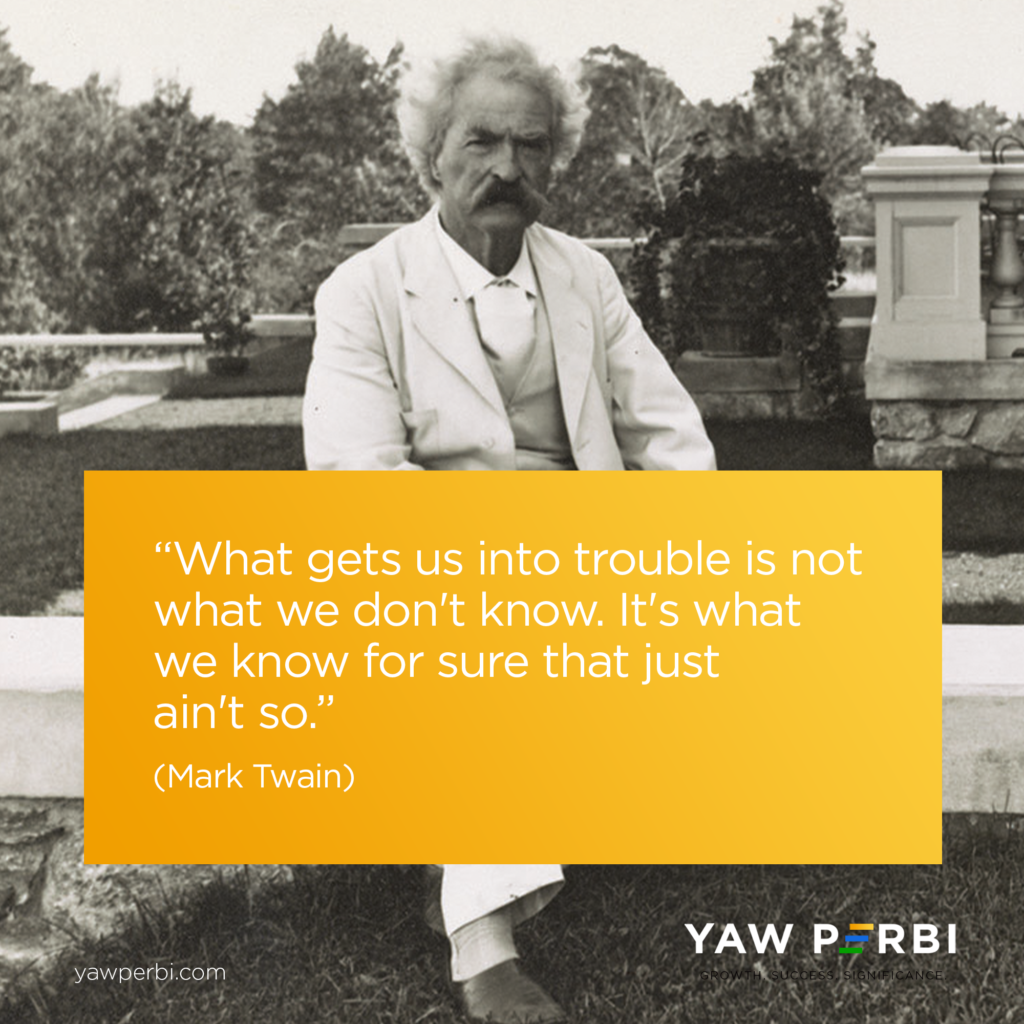
While what you don’t know may kill you; what you think you know but really don’t may kill you faster!
I have wanted to talk about this for months–how to prevent unnecessary hurt from unmet expectations–but last week an incident happened with one of my associates that really catalyzed me to share this urgently. So let’s talk about unmet expectations.
Whether it’s between spouses, parent and child, boss and workers or even among co-workers, family folk and church members, this is quite a common occurrence. This is particularly so African, Chinese, Japanese and Korean cultures that employ indirect communication. If you’re like me, you’ve probably been hurt before by unmet expectations. In fact, sometimes we don’t even realize we had an expectation until it was not met!
Mark Twain once said, “What gets us into trouble is not what we don’t know. It’s what we know for sure that just ain’t so.” We tend to have expectations that are unconscious, unrealistic, unspoken and unagreed upon. Let me share how you can flip these four things around and protect your heart against heartbreaks from unmet expectations. I owe this life-saving lesson from my New Yorkan mentors, Pete and Geri Scazzero.s
THE MILLION DOLLAR QUESTION
How do you know your expectations are valid or not? As hard-to-take as this may seem, when the expectation is unconscious it is invalid. In fact, if even we don’t even know we have them until we are disappointed how on earth is the other person supposed to know and meet it? When it is unrealistic it is invalid as well. Even if it is reasonable and we are conscious of it but it has not been articulated, it is still invalid. The common lame excuse we tend to give is, “Oh, but they should know?!”
In the event that our expectations meet all the above three criteria–conscious, realistic, spoken–but the other party has not agreed to them, they are still invalid. While this may seem very Western, I have learnt as an African-Canadian that it is never wise to assume agreement!
Of course, important caveats include marriage (where the vows already spoken have created certain clear expectations like fidelity), parent-child relationships (expectation of chores) and employer-employee dynamics where expectations have been clearly laid out in contracts and policy and supposedly read and accented to. Even in these relationships with broad-stroke expectations, situations occur that demand clarifying expectations further.
WHAT TO DO TO FORESTALL HEARTBREAKS
To prevent heartbreaks from unmet expectations, ensure your expectations are:
(1) Conscious: I am aware of my expectation.
(2) Realistic: I have evidence to support that the expectation is reasonable in the sense that the other is able and willing.
(3) Spoken: I have expressed the expectation clearly.
(4) Agreed Upon: The other person has agreed to the expectation by saying “yes.”
I would highly recommend you take the Scazzero’s Emotionally Healthy Relationships course for a full meal and good skill-building in this area they call Stop Mind Reading and Clarifying Expectations.
WHAT TO DO WHEN HURT HAPPENS
In the event that hurt still happens from unmet expectations, valid or not, REFRAMING the painful experience is everything. As John Maxwell renders it in the Law of Pain, “good management of bad experiences can lead to growth.” Reframe the painful experience as follows (modified from a Maxwell process):
a) Define the problem –> The painful situation I need to process right now is…
b) Understand your emotion –> My feelings about this are…
c) Articulate the lesson –> My lessons in is this are…
d) Identify a desired change –> The changes I want to effect are…
e) Brainstorm numerous pathways –> The ways out are…
f) Receive others’ input –> What I’m learning from others is…
g) Implement a course of action –> My course of action is 1. Embrace the reality of pain 2. Learn my lesson(s) 3. Share my lessons 4. Change a. ______ b. ______ c. ______ d. _____.
CONCLUSION
You know what they say happens when you assume: you make an ass of u and me. An expectation is only valid when it is mutually agreed upon. Let’s do less heart damage by providing and demanding clear expectations of others. Let’s ensure in all our relationships that our expectations are conscious, realistic, articulated and agreed upon. And when things fall through the cracks and we feel the sting of pain from unmet expectations, let’s reframe the experience well so we can still grow and flourish.
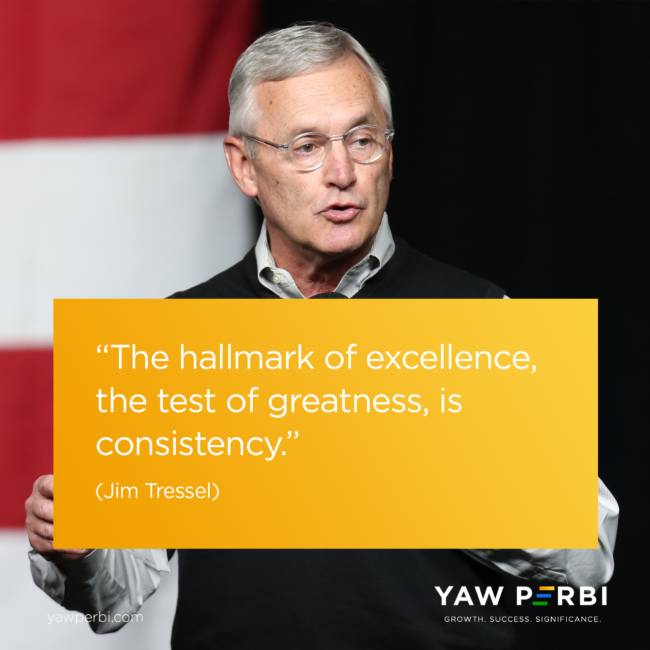
Successful People are Boring
In my late teens when I was introduced to the whole area of personal growth and success I started practising a number of things successful people do without necessarily knowing why. One of them was that they always took their receipts upon purchases. That became an adopted habit for about 10 years before I really got to understand why (that will be for a different day and blog).
One other thing that really fascinated me was the notion that successful people are predictable, consistent; or if you like, plain boring. This was not only in the sense of living a principle-centred life and holding unswervingly to their values but that they had fixed routines. You could literally ‘time them’ and ‘assassinate’ them because it was predictable where they would be, when, and what they would be doing literally every day of the week. That’s precisely what I mean by “successful people are boring.” Same. Same. Same. Same.
So I began to adopt strict routine in many areas of my life including consistently waking up at 4am to spend time in scripture and prayer, thinking, reading and writing. And I have done that consistently for over 25 years now. By the time the rest of the world wakes up and gets going, I would’ve had a 2-3 hour headstart and been über productive.
But now I understand why that consistency breeds success. This is in line with a number of fundamental, universal truths, three of which I would like to share here.
1. RIDING THE LAW OF CONSISTENCY
The Law of Consistency, which leads to growth and success states, “Motivation gets you going; discipline keeps you growing.” Anyone who gets a spark of inspiration or motivation overcomes the law of inertia momentarily but really how long does it last? I heard someone complaining about how transient the umph one gets from motivational talks is. A seasoned motivational speaker responded, rather tongue-in-cheek, “Of course! So are breakfast, lunch and supper!” Like meals, morsels of motivation also need to be taken in reasonable doses several times a day (and in a week) to jumpstart us but what really keeps the wheel of success turning always is discipline. Discipline is doing what we need to do even when we don’t feel like it. And that is the difference between those who succeed and those who don’t. E.M. Gray was spot on: “The successful person has the habit of doing the things that failures don’t like to do. The successful person doesn’t like to do them either, but his dislike is subordinated to the strength of his purpose.”
Disciple is hard; but what makes it more bearable is having a strong WHY, a strong end in mind. The other thing that makes it more doable is discovering your personality (eg. through the DISC behavioural assessment) and linking how you’re wired (what motivates you naturally) with the act you need/want to be consistent with. So for me, being a high D and loving to be in control, I’m greatly motivated to take charge of my morning knowing fully well that no one would be up to disturb me and I can get stuff I want to do done. You’ve got to a find a way, man, for success lies in our daily routine.
“We are what we repeatedly do. Excellence, then, is not an act, but a habit” is famously attributed to Aristotle. What he actually (originally) said was, “As it is not one swallow or a fine day that makes a spring, so it is not one day or a short time that makes a man blessed and happy.” The essence of both statements is the same. John Maxwell pulls no punches here: “You will never change your life until you change something you do daily.” What are you like E-V-E-R-Y-D-A-Y; what do you do E-V-E-R-Y-D-A-Y?
2. RIDING THE LAW OF MOMENTUM
People who are consistent with routine don’t waste precious time and energy figuring out every single day what to do with themselves. If you don’t have a menu, for example (my household does), you know by now how much time and energy can be consumed just by the question: what am I going to eat this afternoon? I have spent an hour on that useless exercise before!
Just like Newton’s first law of motion states, every object will remain at rest or in uniform motion in a straight line unless compelled to change its state by the action of an external force. What is true in Physics–and we tend to appreciate physical laws much more than the unseen laws of life–is the very thing that makes habits so powerful! “Once you pop, you can’t stop” says the Pringles advert. Success can become a habit; so can failure. In fact, Vince Lombardi once said, “once you learn to quit it becomes a habit.” Let the Law of Momentum
When John Maxwell launched 15 Invaluable Laws of Growth in Atlanta, I was there in person. A privileged few joined him for an intimate lunch session. I couldn’t believe the degree of his consistency when talked about his “daily five.” He said, “Everyday I read, I write, I think, I ask questions, I file.”
“Everyday, John?” we asked?
“EVERYDAY,” he responded.
On your birthday, John?
“EVERYDAY,” was his reply.
“On Christmas Day to0, sir?”
“EVERYDAY.”
3. HOW GENIUSES ARE MADE
It was my fellow Canadian, Malcom Gladwell, who first brought to my attention in his book Outliers, that 10,000 hours of practice of any skill makes one a genius. Most people, he said, would’ve done 10,000 of practice within 10 years. During an ongoing Growth Mastermind I was almost envious of the surgeon among us who says everyday he operates; e-v-e-r-y-d-a-y. Imagine his success in 10 years’ time when because of this consistency he has such gained ingenuity! What worthy thing are you doing everyday? Until you’ve done it consistently for 10 years, don’t give up on success just yet.
CONCLUSION
Something you are doing EVERYDAY is determining your future. Conversely, something you are not doing EVERYDAY is determining your future also. More often than not, motivation is overrated. Motivation gets you going but discipline keeps you going, keeps you growing. What will you say is your single most consistent practice (everyday) that has brought you where you are in life today? Please share.
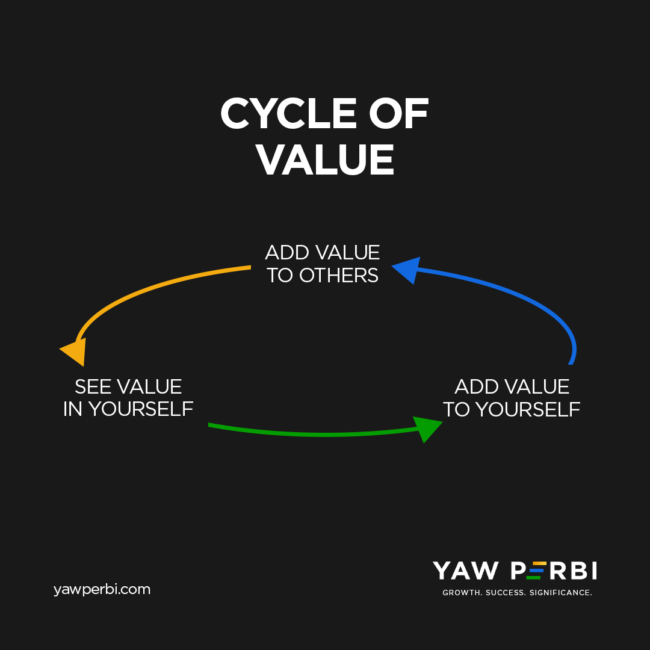
The Cycle of Value
Truly, truly, “you must see value in yourself to add value to yourself.” The author of The 15 Laws of Invaluable Growth calls this principle the Law of the Mirror. Author Denis Waitley put it another way: “Personal development is the belief that you are worth the effort, time, and energy needed to develop yourself.” Investment in your personal growth yields interest–not simple but compound interest–and it is a great deception to not significantly invest in yourself under the guise of ‘self-sacrifice’ for others when the real truth is that you do not see significant value in your own self to make that investment in you.
You are of immense value. This is not based on your net worth or network, salary or social status. It has nothing to do with your height or weight and whether or not you are photogenic and have a great social media following. You and I are of immense value simply because we are human, made in the image and likeness of the Great One. Theologians call this notion of being made in the image of God, imago Dei.
When as coaches we speak of adding value to your life, therefore, we are not implying you could be worth more or less as a human being but that you could develop the innate gifts, passions, dreams and personality traits you have to maximise your potential and impact. Many people, sadly, do not realize they are of immense value and worth that investment. They run around all year, every day, adding value to others through the goods and services they produce as workers but don’t make the time or put aside the money to grow themselves. I repeat: it is a great deception to not significantly invest in yourself under the guise of ‘self-sacrifice’ for others when the real truth is that you do not see significant value in your own self to make that investment in you. Not all so-called ‘self-sacrifice’ is actually ‘noble.’ Yes, “you must see value in yourself to add value to yourself.”
CHICKEN OR EGG
So which one comes first? Seeing value in ourselves and so adding value to ourselves or adding value to ourselves first and then beginning to see value in ourselves? John Maxwell says, “It doesn’t matter which occurs first. One feeds the other. What matters is that the cycle of value starts.”
In addition, adding value to others, making a difference in their lives, has been documented to lift our own self-esteem. As Maxwell puts it succinctly, ‘It’s hard to feed bad about yourself when you’re doing something good for someone else.” Under normal circumstances, “adding value to others makes them value you more” also. In fact, another aspect of seeing and appreciating our own worth comes when we add value to others. Hence the value cycle below.
THE REAL CAP AND REAL KICKER
Herculian governments, Machiavellian bosses, helicopter parents (and the list goes on) can all put a ceiling on our potential but by far our own self esteem is the most significant lid on our potential! Psychiatrist and self-esteem expert Nathaniel Branden put it succinctly: “No factor is more important in people’s psychological development and motivation than the value judgments they make about themselves.” “It is the lid on your potential,” Maxwell chimes in. “If your desire is a 10 but your self-esteem is a 5, you’ll never perform at the level of a 10. You’ll perform as a 5 or lower. People are never able to outperform their self-image.”
And the real kicker is this: the value we place on ourselves is usually the value others place on us. “If you put small value on yourself,” again says Maxwell, “rest assured the world will not raise the price.” I remember being interviewed for the presidency of a Canadian charity and the board requesting that I move my family from one end of the country to the other (and don’t forget, Canada is the second widest country on earth!). I did not feel that was the best move, literally and figuratively, for my family, our God-given purpose in the city of Montreal and even for my vision of expanding the organization beyond where it had been limited to in 25 years. Knowing my value I said “No, thank you.” I politely but clearly and strongly said to the august board: “If this move is that important to you, then I’m not your man for the job.” Needless to say, they went along with my decision and I had the privilege of serving in the role for eight years.
When I mentioned on social media this notion of how others (and indeed life) will only treat us according to the value we place on ourselves, my childhood friend Samuel in Minnesota, USA reminded me of a classic Jessie B. Rittenhouse poem that succinctly captures this principle:
I bargained with Life for a penny,
And Life would pay no more,
However I begged at evening
When I counted my scanty store;
For Life is just an employer,
He gives you what you ask,
But once you have set the wages,
Why, you must bear the task.
I worked for a menial’s hire,
Only to learn, dismayed,
That any wage I had asked of Life,
Life would have paid.
SO WHAT’S YOUR WORTH?
Everyone needs to find the happy middle between being selfless (as if only other people count) and being selfish (as if nobody else counts). If you don’t like what you’re reaping in life then check what you’re sowing. Do you see in yourself the value the Creator does? Do you believe in that value enough to invest in yourself to see grow exponentially, flourish and bless others? For real, there’s a whole wide world waiting to be impacted by you but truly, truly, “you must see value in yourself to add value to yourself.”

